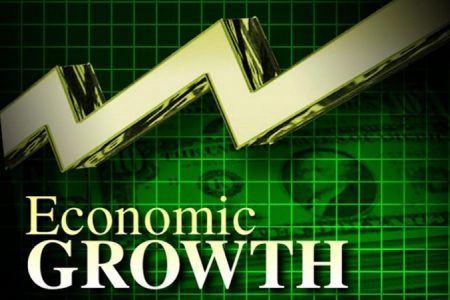Nigeria’s revenue has consistently come from two sources: oil and non-oil. The former, which is oil, has historically been the most significant contributor to budget finance of the nation. Therefore, Nigeria is an economy that is mostly dependent on crude-oil and with the dwindling in the price of crude oil, the country needs not to be told that tough times beckon due to global shocks.
Although technically, I do not share the view that the Nigerian economy lacks diversification, over-dependency on crude oil earnings and issues with revenue has been the case. Nigeria is well diversified in terms of people, culture, resources, and government revenue expectations. But the actual scenario is that we depend mainly on revenue from crude oil sales for foreign exchange earnings.
However, I firmly believe we can achieve more by expanding our foreign exchange earnings capacity. For the records, through diversification, we get revenue from these critical components of the non-oil sector: Federal Government of Nigeria (FGN) share of Value Added Tax (VAT), Company Income Tax (CIT), Customs (Import, exports and fees), independent and other revenues which include dividends, recoveries/fines, among others. We can look inwards to improve on this government revenue positions.
While Nigeria is arguably the most significant oil-exporting country in Africa, the big issue is that the country’s foreign earnings from crude oil consistently experience high volatilities. Moreover, the national budget of Nigeria depends mainly on the earnings from this commodity for the high percentage of the budget implementation. Therefore, in my view, Nigeria’s 2020 budget assumptions, such as the oil production volume of 2.18 million barrel per day, oil benchmark of $57, the N305 exchange rate to the U.S. dollar, GDP growth rate of 2.93 per cent, and an inflation rate of 10.81 per cent projections now appear totally out of reach.
Additionally, the low crude oil price and COVID-19 pandemic effect are likely to impact negatively on these national expectations significantly. Consequently, it might further influence high inflation numbers in the country because the fate of the naira is usually tied to the global oil price regime.
Simply put, volatility in global crude-oil price can cause a drop in the external foreign reserve level, restrict the availability of funds, causing inadequate funding of investments and projects; weakening of foreign exchange earnings, increasing the need for rescheduling debt obligations and increased cost of living. It can even promote and encourage smuggling and the diversion of petroleum products across borders. Apart from all these, the big challenge that Nigeria continues to face due to these current realities is mainly the paucity of revenue.
Therefore, dependency on crude oil earnings majorly has placed the country in an awkward position due to the decline in the oil price and the COVID-19 pandemic. It is imperative to mention that the price of oil is usually out of the government’s control; however, non-oil revenue is very much in their control, and the government needs to act on this fact.
Consequently, it is pertinent to note as a country that we must explore other avenues to make our economy viable rather than depend solely on crude oil for foreign earnings. The option is to focus on the non-oil sectors and give it optimal attention such as the manufacturing, agriculture, information technology, and most importantly the SME sector which can drive job creation, improve industrialization, increase GDP performance, and play a crucial role in the process of economic growth.
Significantly government needs to consider widening the tax net of the country. Taxes are typically the primary source of government revenue of some countries, such as in South Africa with 98 per cent total tax revenue, 80 per cent in Ghana. And in the U.S., 94 per cent of federal revenue is from taxes, according to available reports. Similar economies with comparable parameters with Nigeria are Mexico, Indonesia, Turkey with acronyms (MINT) Nigeria is currently doing poorly. It is widely acclaimed that tax revenues are critical to economic development.
Undoubtedly, the government needs to encourage non-oil sectors and also formulate trade policies to develop and promote competitive trade and investment in the sectors. This response will encourage the development and growth of the non-oil areas without mincing words. However, the most imperative is the creating of an enabling environment, which is necessary to reduce regulatory risks.
Furthermore, Nigeria is yet to fully explore the science and technology sector to boost its financial economy and innovative capabilities. This sector has been the source of technological innovations and digital economy boom in countries such as China, India, and Japan. The development of the science and technology sector is integral to promoting an innovative culture that subsequently encourages the development of the Nigerian economy. The use of technology will allow improvements in our health systems, citizens’ welfare, education, international trade, and infrastructure development. In the business world, it will aid automation of current processes in business, such as distributions, sales, after-sales services, and inventory management, thereby increasing ease of doing business.
Furthermore, the agricultural sector that has been neglected over the years needs revamping, and all the agricultural research institutes across the nation need to be revived. In a recent report, Nigeria’s population has been projected by the United Nations to surpass that of the United States by 2050. Therefore, the food security policy framework to prepare for this population surge and the initiatives to attract investments into the agriculture sector is highly necessary now than ever before. I am equally aware that Nigeria is endowed with several mineral deposits. This could serve as a huge source of additional revenue and employment opportunities. More mineral deposits are yet to be discovered and exploited in the different states of the country. Therefore, the government needs to set the policy to discourage politicizing the implementation of mining projects.
That said, the Small Medium Enterprises (SME) sector needs to be strengthened as well with policy responses to improve service delivery and also boost production. This sector can drive job creation, improve industrialization, increase GDP performance, as mentioned earlier, and it plays a crucial role in the process of economic growth. The nation needs to review regulatory functions on businesses, especially SMEs, and strengthen the entire legal system. This market rule of law will be deepened, and business failures will be reduced.
The current situation with COVID-19 has necessitated the need for economic stimulus for businesses to forestall high business closures and job loss. The government needs to assist with palliatives, policy reforms, sound initiatives, and social intervention programmes targeted at reducing the effect of COVID-19 pandemic, and unemployment is vital at this time to reduce the negative economic impact. Measures to ensure the existence of a sustainable and stable macroeconomic environment is equally central.
In conclusion, Nigeria is adjudged the third host economy for FDI in Africa, behind Egypt and Ethiopia. So, the country is among the most promising poles of growth in Africa and the attraction of numerous investors. Consequently, much attention needs to be given to the issue of persistent insecurity in the country, and the anti-corruption drive of the government needs to be stiffened to attract applaud able foreign portfolio investments into the country. Furthermore, infrastructure development is of optimal importance for the achievement of the developmental goal and sustainable fortune that will attract credible foreign direct investments and investors into the country.
Overall, Nigeria needs to recognize the impact of COVID-19 pandemic on the economy; therefore, urgency needs to go to policy responses to flatten the incidence curve and also deepen Foreign Direct Investment (FDI) participation in promoting foreign private investment.
- Olubiyi, a Chartered Member of the Chartered Institute for Securities & Investment (CISI) and a financial literacy specialist wrote via drtimiolubiyi@gmail.com.
YOU SHOULD NOT MISS THESE HEADLINES FROM NIGERIAN TRIBUNE
Naaba, Utomi, Sani, Yunusa, Sonaya, Others Meet Over New Political Front Monday
Driving towards its agenda of launching a new political movement by January 2021, conveners and members of the National Consultative Front (NCF) will meet on Monday… Read Full Story
MONDAY LINES” When Òsómàáló Buys Coronavirus
I am an Oyo-Yoruba and I know that my ancestors have several pejorative terms to describe the Ijesa. Òsómàáló is one of them. Òsómàáló is a contraction of a Yoruba expression which means ‘I will stay squatting here until I am paid’. Its continued use verbalises the tension that historically defines relations between the wily… Read Full Story
I Am Not An Enemy To Anyone In APC ―Fayemi
As crisis rocking the Ekiti State chapter of the All Progressives Congress(APC) continues unabated, the state governor, Dr Kayode Fayemi has assured that he won’t treat any party members as an enemy despite the attacks being launched against him by some leaders… Read Full Story
47-Year-Old LASTMA Official Stabs Lover, Kills Self Over Infidelity
A 47-year-old official of the Lagos State Traffic Management Authority (LASTMA), Emmanuel Mekuri, has stabbed himself to death following a disagreement with his live-in lover… Read Full Story
Clean Energy Investment: Building On The Ashes Of COVID-19
As the global recovery process from the COVID-19 pandemic tees off, the Sustainable Energy for All (SEforALL) has developed a document, The Recover Better with Sustainable Energy Guide for African Countries to support African countries as they develop their post-COVID-19 recovery plan and stimulus packages… Read Full Story
EDITORIAL: FG’s N13bn Pest Control Intervention Fund
RECENTLY, the Federal Government shocked Nigerians when it announced the setting up a N13.9 billion Pest Control Fund under the Ministry of Agriculture and Rural Development. The fund was approved by the Federal Executive Council ostensibly to address the control of migratory pests, transboundary animal diseases… Read Full Story
VERITATEM: How Ghana Bulldozes Nigeria
ABOUT a fortnight ago, we received the shocking news that the Nigerian embassy staff buildings in Accra were levelled to the ground by a Ghanaian businessman, claiming that the edifice had been erected on his own land. He brought papers claiming ownership of the land. Apparently, our legation could not show proof of… Read Full Story
LEADERSHIP & MANAGEMENT: Are You Hungry For Success?
Success often comes to those who are hungry for it the most. That is the story of the Wright brothers. Before Orville and Wilbur Wright started working on building their aircraft, Samuel Pierpont Langley had covered considerable ground in the effort to fly the first airplane. Langley was a Professor of Mathematics at the… Read Full Story
Freedom From The Trap Of Mastered Helplessness (2)
Happy birthday to Uncle Jimi Solanke, one of the living legends of the creative arts in Nigeria, an accomplished thespian whose interpretation of roles made him bestride the stage of live theatre with ease and aplomb. He turned 78 last Saturday, 4th of July… Read Full Story
The Two Greatest Enemies Of Wealth
Tony Robbins said, “The secret to wealth is simple, find a way to do more for others than anyone else does. Become more valuable. Do more. Be more. Serve more. And you will have the opportunity to earn more.” To access wealth, I want to add mine to it, always learn more, because there is always more to learn! … Read Full Story
Are Ethical Leaders Good For Business?
Via the COVID-19 crisis, we have seen the value of ethical leadership – most notably in New Zealand which, under the courageous, compassionate and ultimately ethical leadership of Prime Minister Jacinda Ardern, has reduced cases to near-zero, while the deadly virus continues to run rampant through much of Europe… Read Full Story






